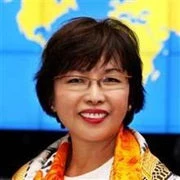 Earlier this month, I was invited to be a keynote speaker on the theme of "Education for Economic Success" at the Education World Forum, which brought education ministers and leaders from over 75 countries together in London.
Earlier this month, I was invited to be a keynote speaker on the theme of "Education for Economic Success" at the Education World Forum, which brought education ministers and leaders from over 75 countries together in London.
Education is fundamental to development and growth. The human mind makes possible all development achievements, from health advances and agricultural innovations to efficient public administration and private sector growth. For countries to reap these benefits fully, they need to unleash the potential of the human mind. And there is no better tool for doing so than education.
Twenty years ago, government officials and development partners met to affirm the importance of education in development—on economic development and broadly on improving people’s lives—and together declared Education for All as a goal. While enrolments have risen in promising fashion around the world, learning levels have remained disappointingly and many remain left behind. Because growth, development, and poverty reduction depend on the knowledge and skills that people acquire, not the number of years that they sit in a classroom, we must transform our call to action from Education for All to Learning for All.
The World Bank’s forthcoming Education Strategy will emphasize several core ideas: Invest early. Invest smartly. Invest in learning for all.
First, foundational skills acquired early in childhood make possible a lifetime of learning. The traditional view of education as starting in primary school takes up the challenge too late. The science of brain development shows that learning needs to be encouraged early and often, both inside and outside of the formal schooling system. Prenatal health and early childhood development programs that include education and health are consequently important to realize this potential. In the primary years, quality teaching is essential to give students the foundational literacy and numeracy on which lifelong learning depends. Adolescence is also a period of high potential for learning, but many teenagers leave school at this point, lured by the prospect of a job, the need to help their families, or turned away by the cost of schooling. For those who drop out too early, second-chance and nonformal learning opportunities are essential to ensure that all youth can acquire skills for the labor market.
Second, getting results requires smart investments—that is, investments that prioritize and monitor learning, beyond traditional metrics, such as the number of teachers trained or number of students enrolled. Quality needs to be the focus of education investments, with learning gains as the key metric of quality. Resources are too limited and the challenges too big to be designing policies and programs in the dark. We need evidence on what works in order to invest smartly.
Third, learning for all means ensuring that all students, and not just the most privileged or gifted, acquire the knowledge and skills that they need. Major challenges of access remain for disadvantaged populations at the primary, secondary and tertiary levels. We must lower the barriers that keep girls, children with disabilities, and ethnolinguistic minorities from attaining as much education as other population groups. “Learning for All” promotes the equity goals that underlie Education for All and the MDGs. Without confronting equity issues, it will be impossible to achieve the objective of learning for all.
Achieving learning for all will be challenging, but it is the right agenda for the next decade. It is the knowledge and skills that children and youth acquire today—not simply their school attendance—that will drive their employability, productivity, health, and well-being in the decades to come, and that will help ensure that their communities and nations thrive.
Read the full text of my speech to the Education World Forum here.


Join the Conversation